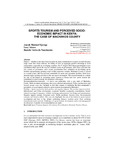SPORTS TOURISM AND PERCEIVED SOCIOECONOMIC IMPACT IN KENYA: THE CASE OF MACHAKOS COUNTY

View/
Date
2017-08Author
Njoroge, Joseph M.
Atieno, Lucy
Nascimento, Daniele Vieira do
Metadata
Show full item recordAbstract
Purpose – Smaller events have been favoured by many commentators in sports research because mega events have been criticised for failing to have an aggregate positive advantage to local communities, especially in developing countries. On 4th August 2010 Kenya promulgated a new constitution which paved the way for a federal system of government. After three years into this new system of governance, most county governments have embarked on developing sports facilities and promoting sporting events in their respective counties. Machakos County is viewed as a model county that has invested remarkably in sports and recreation facilities which have attracted major sporting activities to this new sports destination. This research intends to evaluate the role of devolution in promoting sports tourism in Kenya and how sports tourism has contributed to social economic development in the region.
Design/methodology/approach – A survey was undertaken with a case study of Machakos County. Both secondary and primary data were collected and analysed. Follow up interviews and focused groups were also included as rich data sources in exploring the host community’s perception on social impacts related to sports tourism development in Machakos.
Findings – Sports tourism has both positive and negative impacts. The positive impacts include: Infrastructure and Urban development; economic benefits; community consolidation; Socialcultural exchange; Community visibility and image enhancement; Knowledge and entertainment. Negative impacts include: Economic costs; Traffic problems; Security risks; Environmental concerns and Social conflicts. This case also highlights the role of devolution in sports tourism development and how it has helped cushioning Kenya’s tourism sector from declining international tourist arrivals. Challenges of sports tourism development and event management are discussed. A number of recommendations are made.
URI
http://hdl.handle.net/123456789/2868https://econpapers.repec.org/article/thojournl/v_3a23_3ay_3a2017_3an_3a2_3ap_3a195-217.htm
